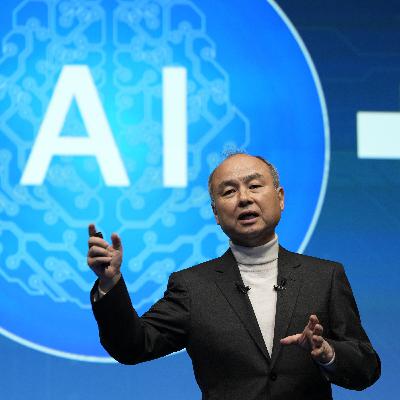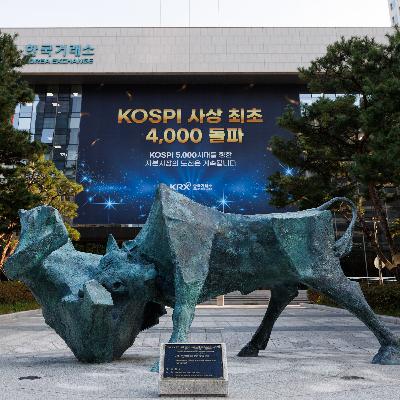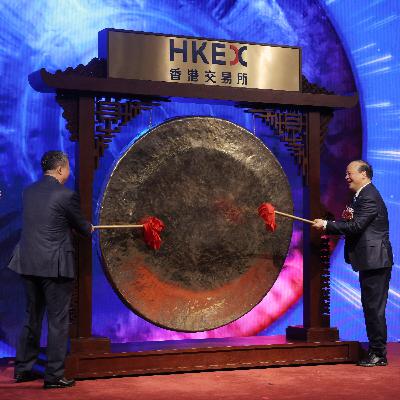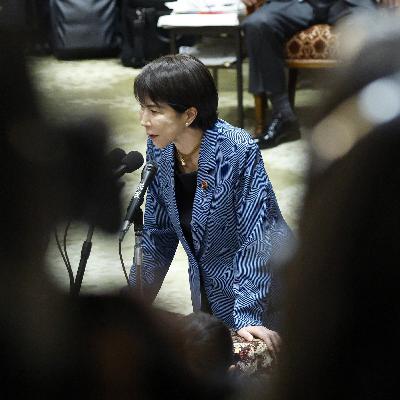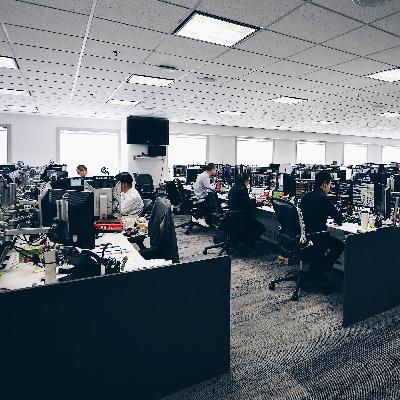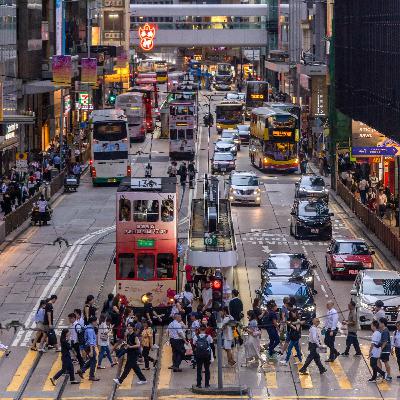Discover Asia Centric by Bloomberg Intelligence
Asia Centric by Bloomberg Intelligence

Asia Centric by Bloomberg Intelligence
Author: Bloomberg
Subscribed: 73Played: 1,726Subscribe
Share
© 2026 Bloomberg
Description
Some of the world's largest and fastest-growing markets, economies and companies are in Asia. Every Thursday, John Lee from Bloomberg Intelligence speaks with experts and newsmakers about the big ideas and trends moving money across the region.
120 Episodes
Reverse
The US dollar is under pressure again as shifting geopolitical risks – from uncertain tariff policies to the Greenland controversy – drive a renewed case for currency diversification and weigh heavily on the greenback. This is being compounded by a widening global policy rift: the Federal Reserve remains on track for multiple rate cuts this year, while other central banks, including Australia and Japan, move in the opposite direction. Is the 15-year dollar bull market officially over? Audrey Childe-Freeman, Chief FX Strategist at Bloomberg Intelligence, joins John Lee on the Asia Centric podcast to unpack the dollar’s recent trajectory. She also discusses why the Swiss franc, euro, Australian dollar, and gold have strong tailwinds in 2026.See omnystudio.com/listener for privacy information.
After hitting a nine-year low in early 2025, Hong Kong's residential property market is showing concrete signs of a turnaround. Home prices have rebounded 9% from their recent trough, fueled by the removal of all property cooling measures and a surge in transaction volumes. Even the commercial sector - still beset by high office vacancy rates - is seeing green shoots, driven by a resurgence in financial services and IPO activity. Can Hong Kong truly decouple from the ongoing property crisis in mainland China? And with the US Federal Reserve entering an easing cycle, will lower borrowing costs be enough to sustain this recovery? Rosanna Tang, Head of Research at Cushman & Wakefield, and Patrick Wong, senior property analyst at Bloomberg Intelligence, join host John Lee to crunch the numbers. Together, they unpack the "wealth effect" driven by a rebounding stock market, the impact of a 270,000-strong influx of talent on the leasing sector, and why it's now often cheaper to buy than to rent in the world’s most expensive housing market.See omnystudio.com/listener for privacy information.
A surprising new bottleneck has emerged in the global AI infrastructure build-out: memory chips. Major manufacturers including SK Hynix, Micron and Samsung Electronics have effectively run out of capacity, sparking a scramble among customers to secure supply. Contract prices for certain DRAM chips surged 78% in the fourth quarter alone, with another 50% jump forecast by March. This price shock is creating a squeeze — especially for makers of smartphones, PCs and automobiles — as memory suppliers prioritize high-margin AI chips over "legacy" components. The result is a widening supply gap that threatens to leave consumer electronics companies struggling to secure essential parts through 2027. MS Hwang, research director at Counterpoint Research, joins John Lee and Bloomberg News technology editor Vlad Savov on the Asia Centric podcast. They unpack the dynamics of the shortage and how Chinese upstarts are racing to fill the void.See omnystudio.com/listener for privacy information.
Global military budgets are surging at a pace unseen since the Cold War, fueling a defense-spending supercycle. NATO allies are aiming to spend up to 5% of GDP on defense by 2035, while Asian powers such as Japan and South Korea are also boosting spending. This environment has been a boon for defense stocks, with South Korea's Hanwha Aerospace rising a spectacular 2,600% since the start of the Russia-Ukraine War, even eclipsing Rheinmetall's 1,700% run. Is the defense spending supercycle sustainable? And which companies and countries stand to benefit from this surge? Wayne Sanders, senior defense analyst and retired US army colonel, and Eric Zhu, aerospace and defense analyst – both at Bloomberg Intelligence – join John Lee on the Asia Centric podcast. They also discuss the evolving roles of air defense, hypersonics and space in future conflicts.See omnystudio.com/listener for privacy information.
Humanoid robots have become one of the hottest investment themes, with a basket of Asian-related stocks rising more than 70% over the past year. The technology stole the show at CES 2026 with eye-opening demos from Boston Dynamics and Unitree, while expectations for Tesla's Optimus are increasing as the company races toward production this year. Yet, expectations may be outpacing commercial reality. While some street estimates project revenue in the hundreds of billions, Bloomberg Intelligence takes a more measured view, forecasting a $5 billion total addressable market for automotive assembly by 2035. Takeshi Kitaura, senior industrials analyst at Bloomberg Intelligence, joins host John Lee to dissect the sector's outlook. They explore the emergence of “physical AI”, the viability of replacing human labor on factory floors, and whether the US or China holds the advantage in this evolving race.See omnystudio.com/listener for privacy information.
India's stock market has seen an explosion in retail participation, skyrocketing to more than 125 million registered investors from 20 million pre-pandemic. While 70% of these new investors are under 30, the boom is broad based: female participation has surged to nearly a quarter of the market, and half of all accounts now hail from rural areas. However, this new cohort's desire for "instant gratification" has fueled a speculative frenzy in derivatives, prompting regulator SEBI to step in with new rules to cool the market. Jayprakash Gupta, founder of online trading platform Dhan, joins John Lee to explain how wide-ranging digitization efforts – from banking access to mobile penetration – laid the foundation for this growth. He discusses the impact of SEBI's recent crackdown on trading volumes and explains why he remains bullish on India's financial markets, pointing to low penetration rates, strong mutual fund inflows and a robust pipeline of IPOs.See omnystudio.com/listener for privacy information.
Launching a multi-strategy hedge fund has never been tougher. Giants such as Millennium, Point72 and Citadel dominate the space, while spiraling pay and a fierce "war for talent" have pushed entry barriers higher than ever. So why leave a top role at one of the world’s biggest funds to start a rival? Jonathan Xiong, CEO & CIO of Arrowpoint Investment Partners and former co-CEO of Millennium in Asia, joins John Lee on the Asia Centric podcast to answer that question. With more than $1.5 billion in assets and growing, Arrowpoint is one of the most significant launches out of the region in recent years. Xiong discusses the difficulties of starting a multi-strategy fund, the hidden dangers of the "cost pass-through" model, and how he stood out from the crowd by identifying a unique gap in the Asian market. This episode was recorded in December 2025.See omnystudio.com/listener for privacy information.
Geopolitical risk is often seen as a market threat, yet the rivalry between Washington and Beijing is driving a wave of investment opportunities. The US push for re-industrialization is boosting demand for Asian exports in sectors such as shipbuilding, power generation and semiconductors while China’s investment in "new productive forces" accelerates its high-end manufacturing upgrade. Timothy Moe, chief Asia-Pacific equity strategist at Goldman Sachs, joins John Lee on the Asia Centric podcast. Moe explains why technology will remain a dominant theme in 2026 and why the firm is overweight Asia ex-Japan, forecasting the region will outperform the US and Europe. He also details why South Korea remains his top pick, citing 35% projected earnings growth and reasonable valuations, and outlines the rationale for his recent upgrade of India. This will also be our last episode for 2025 and we will re-commence on January 8 with a new line up of exciting speakers.See omnystudio.com/listener for privacy information.
SoftBank is doubling down on artificial intelligence with a $30 billion commitment to OpenAI and ambitious plans for Stargate – even as risks mount. After a 200% surge earlier this year, shares tumbled 40% in November when Google’s Gemini 3.0 gained traction, threatening ChatGPT’s dominant position in the AI race. Credit stress is rising, with CDS widening to nearly 300 basis points as funding concerns build. Investors and creditors are increasingly uneasy as OpenAI now accounts for about 20% of SoftBank’s net assets, turning what was once seen as a bold growth play into a potential source of concentrated risk. Bloomberg Intelligence equity analyst Kirk Boodry and credit analyst Sharon Chen join John Lee on the Asia Centric podcast. Together they unpack SoftBank’s AI ambitions, its reliance on margin loans and the implications of circular financing. They also weigh up Masayoshi Son’s track record – spectacular wins such as Alibaba and painful failures like WeWork – against his latest AI gamble.See omnystudio.com/listener for privacy information.
It’s time to look ahead and make bold predictions for Asia in 2026. After a standout year, Asian equities are on track to beat the S&P 500 by the widest margin in eight years. Can the rally continue, and which markets will lead? Are investors overlooking US funding stress, potential QE, and the risks behind multi-decade tight credit spreads? And what’s next for Asian currencies and gold? Asia Centric convenes Bloomberg Intelligence strategists for a forward-looking discussion. Host John Lee is joined by Senior Equity Strategist Marvin Chen, Chief Asia FX Strategist Stephen Chiu and Senior Credit Strategist Timothy Tan as they unpack AI-driven growth, shifting currency dynamics, structural liquidity risks, and the potential repatriation of trillions in global capital back to Asia.See omnystudio.com/listener for privacy information.
Regulators around the world, from the US to Singapore and Australia, are trying to revive initial public offerings. The London Stock Exchange raised less than $2 billion since the beginning of 2024, its worst drought since 1998, while the number of publicly listed companies in the US has halved from 8,000 in 1996. Regulatory burdens, litigation risks and abundant private capital have pushed companies to remain private. Paul Atkins, chairman of the US Securities and Exchange Commission, has vowed to "make IPOs great again". But what can regulators do to entice companies to list? And why is Hong Kong bucking this trend – the city is on track to raise more than $40 billion this year and has a pipeline of more than 300 mainland Chinese firms seeking listing. Larry Tabb, Bloomberg Intelligence head of market structure research, and Sharnie Wong, BI senior analyst – diversified financials, joins John Lee on the Asia Centric podcast.See omnystudio.com/listener for privacy information.
Inflation has returned to Japan after decades of near-zero price growth, with consumer prices rising close to 3% – the fastest since the 1980s. The cost-of-living squeeze, driven by food prices, helped topple the previous administration and propel Sanae Takaichi to power as Japan's first female prime minister. Her pro-growth, big government stance promises fiscal stimulus, but risks complicating the Bank of Japan's efforts to contain sticky inflation. Taro Kimura, Japan senior economist at Bloomberg Economics and Bank of Japan veteran, joins John on the Asia Centric podcast. He explains why inflation may be higher for longer and what Takaichi's policies mean for BOJ independence. He also covers the prime minister's remarks on Taiwan that sparked tension with Beijing, adding a geopolitical layer to Japan's economic challenges.See omnystudio.com/listener for privacy information.
South Korea's Kospi Index has surged about 70% this year, driven by AI-linked tech stocks such as Samsung Electronics and SK Hynix. Retail investors, who poured more than $100 billion into US equities since the pandemic, are now turning their attention homeward. President Lee Jae Myung's pro-market and corporate governance reforms, including dividend tax cuts from 49% to a proposed 25%, are reshaping investor sentiment and capital flows. Peter Kim, managing director and investment strategist at KB Securities, joins John on the Asia Centric podcast. Kim discusses the sustainability of South Korea's rally, Seoul's overheated property market and the geopolitical balancing act between China and the US.See omnystudio.com/listener for privacy information.
China's AI rollout diverges sharply from the US, favoring open-source models and broad adoption over high-cost infrastructure. China's top tech firms including Tencent, Baidu and Alibaba will invest less than 10% of the $370 billion that US hyperscalers plan to spend on AI capex this year. This cost-conscious approach aligns with Beijing's AI Plus strategy, aiming to embed AI across all sectors by 2027 to boost productivity. Who will win the AI race? And are we in a bubble in AI infrastructure spending? Robert Lea, senior tech analyst at Bloomberg Intelligence, joins John to discuss why China's broader economy, rather than its tech companies, may be the main beneficiary of the nation's AI rollout.See omnystudio.com/listener for privacy information.
Some of the world’s largest companies by revenue – such as Vitol, Trafigura, and Cargill – operate outside the public eye, trading oil, metals and grains at scale. These private firms have quietly become central to global supply chains, recording substantial profits since 2022 as wars and sanctions re-routed flows. Giovanni Serio, former global head of research at Vitol, joins John and Katia to unpack how commodity traders operate, why scale and flexibility matter, and how satellite data and real-time analytics have transformed market transparency. Serio also discusses oil price dynamics, the rise of non-OPEC supply, and why most trading firms remain private despite their size.See omnystudio.com/listener for privacy information.
The world's demographic shift is often framed as a looming crisis, but new data suggests a more nuanced outlook. Hong Kong leads the longevity frontier with an average life expectancy of 86 years, having steadily increased by 0.25 years annually for over 150 years. Meanwhile, a landmark IMF study finds that today's 70-year-olds have the same cognitive ability as 53-year-olds in 2000, underscoring how healthier aging is reshaping workforce dynamics. Kevin Daly, managing director and senior economist at Goldman Sachs, joins John and Katia to discuss why aging may not be economically detrimental, how healthier lives extend workforce participation, and why the “silver economy” narrative oversimplifies consumption trends. Read Goldman Sachs’ related research: The Path to 2075 — The Positive Story of Global Aging (https://www.gspublishing.com/content/research/en/reports/2025/05/20/2d3fe290-10b1-44be-8d0e-77b8d303928f.html)See omnystudio.com/listener for privacy information.
In this live episode, recorded at Bloomberg's Investment Management Summit in Singapore, we sit down with Matthew Michelini, head of Asia-Pacific business for Apollo Global Management. We explore his optimism about Japan, driven by its corporate governance reform and the vast $7.5 trillion in consumer deposits. We also discuss how private capital is shaping asset allocation and the challenges posed by intense competition in the private-equity industry. See omnystudio.com/listener for privacy information.
Singapore’s government is investing heavily to become a global hub for finance, commodities and transportation. The spending includes $3 billion for Changi airport’s terminals and infrastructure and equity market reform to attract more capital. Singapore’s household assets could nearly double to $4 trillion by 2030 and the MSCI stock index is set to double in the next five years, according to Morgan Stanley. Nick Lord, research director for the Asean research department at Morgan Stanley and who authored a report this year on the subject, says the equity market reforms are key to unlocking growth. He discusses the latest developments in the city state with John and Katia.See omnystudio.com/listener for privacy information.
The competition is intensifying among global hedge funds giants to attract top traders and analysts. There's particularly high demand for talent at "pod shops", which allow portfolio managers to run their own strategies and manage allocated capital. High-profile managers with strong track records can command pay packages in the tens of millions of dollars. "The type of manager we're trying to hire, they are hiring us. It's not [us] hiring them", says Jay Luo, President of Dymon Asia Capital, a regionally focused alternative manager with about $5 billion in assets. He likens managing a pod shop to running a high-performance sports team and shares his insights on competing against global hedge funds like Millennium and Point72 -- with hiring the right person sometimes years in the making. He joins John and Katia on the Asia Centric podcast.See omnystudio.com/listener for privacy information.
Hong Kong's financial sector is roaring back, with IPOs surging and the city's exchange leading the world in public fundraising. The Hang Seng Index is up more than 30% this year, driven by biotech and tech stocks, while new stablecoin regulations are positioning Hong Kong as a digital-assets hub. Billions in untapped funds from mainland China are flowing in, fueling a wave of new family offices and a generational shift in wealth management. Vivien Khoo, CEO of the Private Wealth Management Association in Hong Kong and a member of the government's Web3 task force, joins John Lee to discuss the drivers behind the city’s comeback. She shares insights into Hong Kong’s evolving role as a global connector, the rise of next-gen investors and the impact of digital-asset regulation.See omnystudio.com/listener for privacy information.










